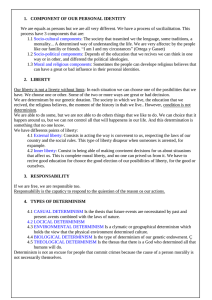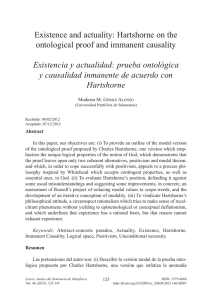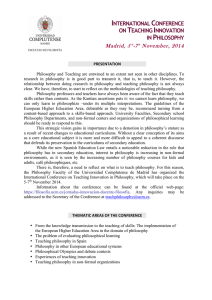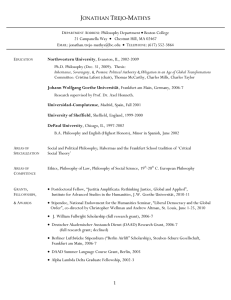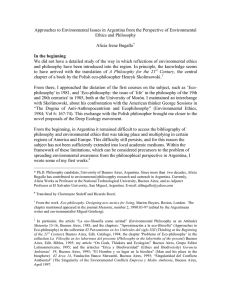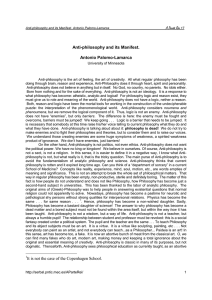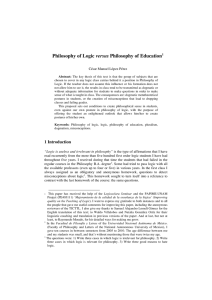On Hartshorne`s Objections to Determinism and Compatibilism
Anuncio
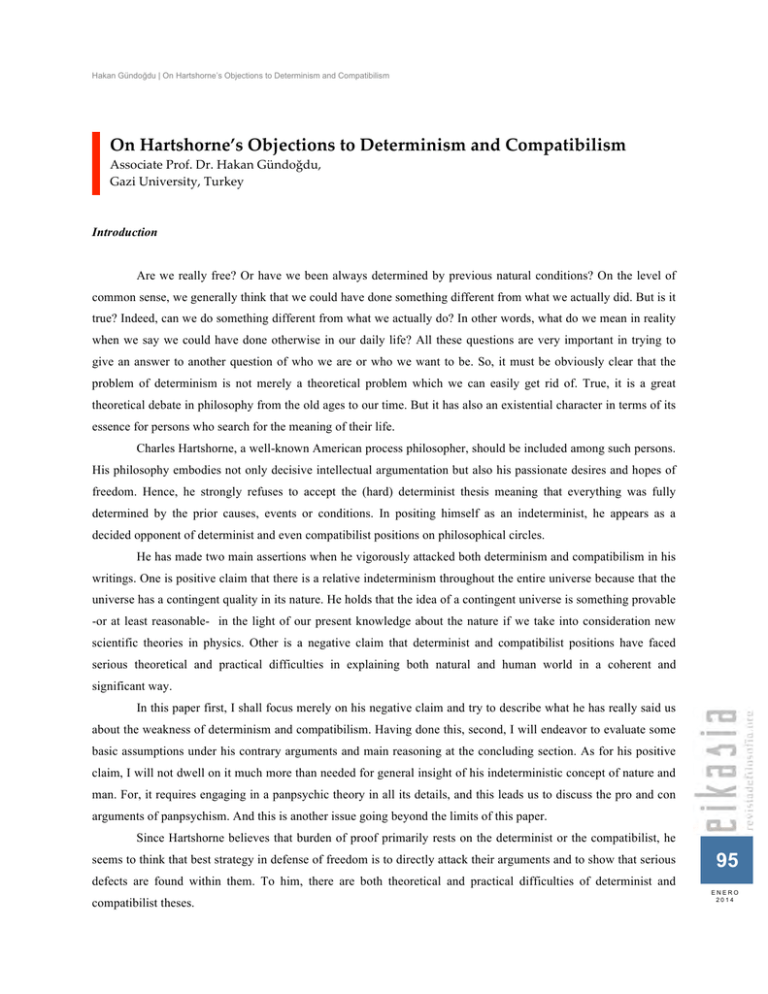
Hakan Gündoğdu | On Hartshorne’s Objections to Determinism and Compatibilism On Hartshorne’s Objections to Determinism and Compatibilism Associate Prof. Dr. Hakan Gündoğdu, Gazi University, Turkey Introduction Are we really free? Or have we been always determined by previous natural conditions? On the level of common sense, we generally think that we could have done something different from what we actually did. But is it true? Indeed, can we do something different from what we actually do? In other words, what do we mean in reality when we say we could have done otherwise in our daily life? All these questions are very important in trying to give an answer to another question of who we are or who we want to be. So, it must be obviously clear that the problem of determinism is not merely a theoretical problem which we can easily get rid of. True, it is a great theoretical debate in philosophy from the old ages to our time. But it has also an existential character in terms of its essence for persons who search for the meaning of their life. Charles Hartshorne, a well-known American process philosopher, should be included among such persons. His philosophy embodies not only decisive intellectual argumentation but also his passionate desires and hopes of freedom. Hence, he strongly refuses to accept the (hard) determinist thesis meaning that everything was fully determined by the prior causes, events or conditions. In positing himself as an indeterminist, he appears as a decided opponent of determinist and even compatibilist positions on philosophical circles. He has made two main assertions when he vigorously attacked both determinism and compatibilism in his writings. One is positive claim that there is a relative indeterminism throughout the entire universe because that the universe has a contingent quality in its nature. He holds that the idea of a contingent universe is something provable -or at least reasonable- in the light of our present knowledge about the nature if we take into consideration new scientific theories in physics. Other is a negative claim that determinist and compatibilist positions have faced serious theoretical and practical difficulties in explaining both natural and human world in a coherent and significant way. In this paper first, I shall focus merely on his negative claim and try to describe what he has really said us about the weakness of determinism and compatibilism. Having done this, second, I will endeavor to evaluate some basic assumptions under his contrary arguments and main reasoning at the concluding section. As for his positive claim, I will not dwell on it much more than needed for general insight of his indeterministic concept of nature and man. For, it requires engaging in a panpsychic theory in all its details, and this leads us to discuss the pro and con arguments of panpsychism. And this is another issue going beyond the limits of this paper. Since Hartshorne believes that burden of proof primarily rests on the determinist or the compatibilist, he seems to think that best strategy in defense of freedom is to directly attack their arguments and to show that serious 95 defects are found within them. To him, there are both theoretical and practical difficulties of determinist and compatibilist theses. ENERO 2014 On Hartshorne’s Objections to Determinism and Compatibilism | Hakan Gündoğdu Some Theoretical Difficulties in Determinism Hartshorne is deeply confident that absolute determinism is false in its theoretical bases, and that its falsity can be easily shown to those people who are sincere in their desire to know the truth1. In order to do this, first, he directly challenges the notion that science suggests the existence of absolute laws throughout the universe in support of determinism. The main assumption of the determinism is that we have to find out strict laws used for explaining the nature if we will take science seriously. But practice of science, says Hartshorne, has ever not established the existence of strict laws which determinism assumes. Observation can not give us that kind of certitude about the laws.2 The idea of law in sciences is indeed not a deterministic but statistical one.3 The claim that science demands us to think deterministically must be therefore rejected on the ground of the statistical character of the laws.4 At that point, we see that Hartshorne many times referred to both such scientists as Clerk Maxwell, Gibbs, Darwin, Mendel and Bolzman who have defended statistical notion of law and to such indeterminist philosophers as Epicurus, Peirce, Bergson and Whitehead who were seriously concerned with physics as well as philosophy.5 What all those persons did set out to show is that the certitude of basic laws has actually depended on the large number of similarities between happening events rather than on the precise causal determination of the events taken singly.6 However, is such an argument which is built on base of similarity enough to falsify the claim of the determinism? For instance, Cassirer has seriously attacked this similarity thesis by maintaining that if strict laws are statistical and thus applicable to only collectives not to individual events, then statistical laws are uncompromised with determinism. Statistical laws can be compromise with determinism on account of that they are applicable to only collectives. Despite this, they are in fact incompatible with indeterminism. For, indeterminism in opposition to determinism means that there must be alternative laws in nature as well as there must be different ways in which an individual event can occur. But, says Hartshorne, Cassirer has made only a strategic and deceiving move that we have to choose either order provided by determinism or chaos produced by indeterminism. The temptation here is that he has improperly redefined determinism and indeterminism in order to be able to posit them in contrary absolute stands. And hence Hartshorne directs his attack against these redefinitions by reminding us both that determinism is to say merely that every event in all detail is determined by its prior conditions or causes and that indeterminism no needs to absolutely deny the notions of regularity and causality.7 Still, according to him, it is possible that one may use the word determinism for the mere assertion that 96 ENERO 2014 1 C. Hartshorne, The Zero Fallacy and Other Essays in Neoclassical Philosophy, 1997, (ed. Mohammad Valady), Chicago: Open Court, p. 195196; Charles Hartshorne, “Beyond Enlightened Self-interest: A Metaphysics of Ethics”, Ethics, vol. 84, n. 3, p. 211 (1974). 2 C. Hartshorne, “Indeterministic Freedom as Universal Principle”, Journal of Social Philosophy, v.15, n. 3, p. 9, (1984); C. Hartshorne, “Freedom Requires Indeterminism and Universal Causality”, The Journal of Philosophy, v.55, n.19, p. 796 (1958). 3 C. Hartshorne, Beyond Humanism: Essays in the New Philosophy of Nature, 1937, (Willett, Clark Company), Chicago-New York, p.143; C. Hartshorne, “Contingency and the New Era in Metaphysics (I)”, The Journal of Philosophy, v. 29, n. 16, p. 423 (1932). 4 C. Hartshorne, The Logic of Perfection and Other Essays in Neoclassical Metaphysics, 1962, Open Court Publishing, Lasalle-Illinois, p. 167. 5 C. Hartshorne, “Indeterministic Freedom as Universal Principle”, pp. 5-6; C. Hartshorne, “Freedom Requires Indeterminism and Universal Causality”, p. 797. 6 C. Hartshorne, The Logic of Perfection and Other Essays in Neoclassical Metaphysics, p. 167. 7 Ibid, p. 181. Hakan Gündoğdu | On Hartshorne’s Objections to Determinism and Compatibilism every event has its cause or causes, and indeterminism to mean that at least some events have no causes, thus making the issue one between two absolutes by disregarding a triadic choice including a relativistic view. But if one does so, then this renders indeterminism a doctrine which no one defends.8 Once this was recognized, contends Hartshorne, we might say that universal causality is not the same as determinism. The different among deterministic and indeterministic definitions of cause is not related to the idea of whether or not every event has a cause. Rather, it is about how causes are connected to their effects.9 An indeterminist agrees with a determinist that every event has a cause or causes although he disagrees with him or her that every event is absolutely determined by its previous causes.10 Because, the cause, for Hartshorne, means a necessary condition for the occurrence of an event. In other words, it is a condition without which any event can not happen. He has thus made a distinction between necessary and sufficient conditions of any phenomena. He writes: “‘Necessary’ is that without which the phenomenon will not occur, ‘sufficient’ that with which it certainly will occur”.11 That’s, in his opinion, the latter is not identical to the former. Instead, the former is only a part of the latter. From this distinction, he maintains that the fulfillment of all necessary conditions of any event does not show that the event will certainly happen. The sole thing be inferred from their fulfillment is that the event may happen because that the effects of necessary conditions are less tangible compared to what actually happens. Necessary conditions only draw the limits in which the indeterminacy of the event turns into the concreteness of what actually happens. Hartshorne’s indeterministic perspective is obviously clear: there are neither uncaused happenings nor fully determined happenings.12 The causes are not sufficient to guarantee what concretely happens later although they are necessary in the beginning of events.13 Every event has a proportional spontaneity.14 Put differently, all events are not wholly determined by previous cause or causes but only conditioned by them. Conditioning sets limits to the effects of causes without fully determining the effects in a very strict way.15 Given this distinction of causing and conditioning, it may be asserted that he also rejected the parallelism of Hume as well as determinist thesis by following Peirce, Bergson and Whitehead. Indeed, he strongly criticizes some basic assumptions of parallelism: Its first assumption is that (1) all necessities, regardless of being logical or not, must always effect the events in their all details. Hartshorne takes this assumption a bias of classical physics considering merely the quantitative character of the events not their qualitative one. Yet, says Hartshorne, a new physics as quantum mechanics stresses the qualitative aspects of the events and thus makes it possible to think that necessities effect the events only in their certain limited aspects. Second assumption accepts (2) necessary causal connections must either logical necessities connecting events with following events in their full particularity or else 8 C. Hartshorne, “Freedom Requires Indeterminism and Universal Causality”, p. 793. Ibid, p. 793. 10 Ibid, p. 794. 11 C. Hartshorne, “Causal Necessities: An Alternative to Hume”, The Philosophical Review, v. 63, n. 4, p. 497 (1954). 12 C. Hartshorne, The Zero Fallacy and Other Essays in Neoclassical Philosophy, p. 195. 13 Ibid, p.114. 14 C. Hartshorne, “Freedom Requires Indeterminism and Universal Causality”, p. 806. 15 C. Hartshorne, The Zero Fallacy and Other Essays in Neoclassical Philosophy, pp. 135-136. 9 97 ENERO 2014 On Hartshorne’s Objections to Determinism and Compatibilism | Hakan Gündoğdu not logical necessities at all16. But Hartshorne holds that this dilemma is illogical because its dichotomy is false: neither every particular event is contained in its previous cause or causes, nor the word necessity has a meaning without being logical. Moreover, causal necessities can be logical without fully connecting the events to each other in their particular natures.17 How could such a thing be possible? The answer to this question is found in his indeterminist notion of cause in the sense that the causes of an event provide not its actuality but only its possibilities. Actuality is much more than mere possibility: it is an act of becoming which no belongs to the cause but to the event itself. Here, the role of cause is nothing but to determine the common nature of all possibilities as regards any event.18 Causal necessities logically indicate only possible results, not inevitable ones. With this contention, he has suggested that the ‘necessary’ always means what is common to all possibilities.19 Although causal order is necessary, the idea of ‘necessity’ need not lead us to suppose that there exists an unchangeable and fixed form of regularity throughout the universe.20 As a result of this, he objects the claim that universals entirely determine their particular instances by applying to the concept of mathematical universals. In fact, determinism is, to him, a result of the misunderstanding about the relation between mathematics and knowledge of reality.21 True, each number in mathematical system has absolute determinate relations to other numbers. But, this abstract inner relation of mathematical systems is very different from concrete external relation in real world of particularities. A mathematical system is composed of universals or ideas, whereas the real world is made of tangible individuals or events; that’s, the laws of mathematics are about the ideas not real things.22 Hence, if there are universals in real world, their relation to their particular instances must be non-deterministic relations. It seems that here Hartshorne takes the universals ‘determinable’ not ‘determinate’ things.23 In this case, there are naturally no absolute equals in real world: with a simple observation about nature, we can see that an event A can be equal to an event B, event B to event C, and event C to event D, but we can also see that event A and event D are not always equal to each other in spite of all these previous equalities.24 From this observation, he says that nature is in its observable character contingent rather than necessary. In other words, the world could be otherwise. But ordinary observation is not sole evidence showing us the contingency of the nature. In addition to that, quantum physics has a significant role in comprehending the contingency of nature because it discloses the contingent character of ultimate physical particulars like the indeterminacy of the motions of electrons at the sub-atomic world. Consequently, the relation of universals to their particular instances can not be taken as 16 98 ENERO 2014 C. Hartshorne, “Freedom Requires Indeterminism and Universal Causality”, p. 802; C. Hartshorne, “Causal Necessities: An Alternative to Hume”, p. 480. 17 C. Hartshorne, “Causal Necessities: An Alternative to Hume”, pp. 480-482. 18 Ibid, p. 497. 19 C. Hartshorne, “Freedom Requires Indeterminism and Universal Causality”, p. 802. 20 C. Hartshorne, “Causal Necessities: An Alternative to Hume”, p. 498. 21 C. Hartshorne, Beyond Humanism: Essays in the New Philosophy of Nature, p. 148. 22 C. Hartshorne, Ibid, p. 133; C. Hartshorne, “Are There Absolutely Specific Universals?”, The Journal of Philosophy, v. 68, n. 3, p. 76 (1971). 23 C. Hartshorne, Beyond Humanism: Essays in the New Philosophy of Nature, p. 134. 24 C. Hartshorne, “Are There Absolutely Specific Universals?”, p. 76. Hakan Gündoğdu | On Hartshorne’s Objections to Determinism and Compatibilism merely a relation of necessity in no way.25 Otherwise, we could not succeed in explaining the concepts of possibility, purpose, time and becoming which we often use in our daily life. But, determinism makes all of them meaningless. First, let’s take up the concept of ‘possibility’. Possibility, says Hartshorne, is an element of indecision especially concerning with the events which will happen in future. It implies what might be or might not be in the future.26 But, determinism argues that what actually happens now or what will occur in future is the sole thing which can happen. And this means that there is but one possibility and indeed that there are no possibilities at all. For, to speak of possibilities is to speak of alternatives in any case. If there are really no alternatives, then there is nothing called possibility.27 The possibility is simply reduced to that of necessity by destructing the modal contrast on which the senses of the terms depend. And this makes the separation of necessity and possibility disappear.28 Second, Hartshorne goes on to urge that determinism also causes to lose the meaning of the word ‘purpose’. For, they are universals and so are somewhat indeterminate in his understanding. If they fully determine what actually happen, this means that the separation of intent and its actualization would be senseless. In other words, for him, determinism can not be compatible with the idea of teleology.29 The fault of those who tries to combine determinism and teleology is found in their unseeing that utterly controlling purpose would be the sole purpose. Whereas, if the case really was so, the other purposes could not be ever actualized. Even have supposed that there are only two purposes, their accordance within real world must have still been a matter of chance which no intended before.30 Or else, an idea of absolute purpose would deny the individuality, chance and teleology in any case.31 Third, he argues that similarly determinism makes the concept of time meaningless. In deterministic stance, for him, the present absolutely determines the future in its all details. But, on this case, what distinguishes the future from the present and even the past is any more absent. Fundamental distinctions among them have been entirely annihilated by determinism. Whereas, our knowledge of the world is that of events happen in the timeworld. Time can therefore be a real and open thing if and only if determinism is false. If not, the words real and unreal would certainly lose their sense in common language32. Now there is no doubt at all that Hartshorne thinks of the asymmetric character of time as only true understanding of time in opposition to the determinist’s notion of symmetric time which considers causal order as applying equally to both retrospective and prospective relations. To admit a notion of symmetric time is essentially to assume that cause is equal to its effect. But, Hartshorne warms us that it is a deterministic bias which can be named the prejudice of symmetry. For him, symmetrical ideas are derivative, but ultimate relations like causality 25 C. Hartshorne, “Contingency and the New Era in Metaphysics (II)”, The Journal of Philosophy, v. 29, n. 17, p. 459 (1932). C. Hartshorne, Beyond Humanism: Essays in the New Philosophy of Nature, p. 130. C. Hartshorne, “Causal Necessities: An Alternative to Hume”, p. 485. 28 C. Hartshorne, “Indeterministic Freedom as Universal Principle”, p. 9; C. Hartshorne, Beyond Humanism: Essays in the New Philosophy of Nature, p. 139. 29 C. Hartshorne, Ibid, p. 135. 30 C. Hartshorne, The Logic of Perfection and Other Essays in Neoclassical Metaphysics, p. 214. 31 Ibid, p. 206. 32 C. Hartshorne, Beyond Humanism: Essays in the New Philosophy of Nature, p. 138. 26 27 99 ENERO 2014 On Hartshorne’s Objections to Determinism and Compatibilism | Hakan Gündoğdu must be non-derivative and thereby be asymmetric. Either the cause must be, for example, greater than the effect or vice versa. Which one is true? He writes: “The answer is again given by simple analysis of meanings. In a causal transaction in which, from the set of conditions C issues a result E, we have first C alone and then C and E. Thus the total result of causation is in every instance an enhancement of reality, the creation of a new whole. … Any denial of the creative aspect of process leads to antinomies. Thus, if it be said that when E is actual, C the cause has ceased to be, we face the contradiction of an alleged causal relation of E to C, although there is said to be no such thing as C to serve as term of this relation. And if it be said that from an ultimate or eternal point of view there is no such thing as ‘C alone,’ but only C as prior to E, or E as subsequent to C, then, since these two complexes are equivalent, one is defying the indications of logic that equality, a symmetrical relation, is derivative.”33 What all these shows is that the problem of causality or determinism has always a dimension related to the problem of time and becoming. Although he has been against notion of time and principle of natural coherence admitted by Kant, Hartshorne has recognized that such philosophers as Kant did see the core of the issue but others like Spinoza, Leibniz and Hume failed to understand it.34 In other words, some things in the world are necessary, but some other things are contingent. Both necessity and contingency, for him, are ultimate traits of the world of becoming within time.35 Having considered theoretical difficulties carefully, Hartshorne eventually draws a conclusion that deterministic arguments presented here are not persuasive for him, and then notices that we shouldn’t in theory identify determinism and causality if we sincerely want to believe that we are free in a causal world. Practical and Ethical Difficulties in Compatibilism Apart from these considerations against determinism, Hartshorne has also objected the compatibilist thesis which asserts both determinism and human freedom are true in real world. To compatibilists, if we can do what we want to do or rather if we can do it without any external coercion on our action, then it means that, whatever causal conditions are, we are free.36 By this claim, however, they have said that they wouldn’t mind if freedom was actually true or not. What they did instead is merely to redefine the freedom in a way which allows us to accept the notion that we could be considered free even on the condition that we were completely determined by previous causal conditions. He has made the point in general: “this is like telling us that we are not in chains in so far as we don’t mind or notice the chains”.37 In fact, I think, he is certainly right at that point. For, they have tried to solve such a contingent issue as 33 100 ENERO 2014 C. Hartshorne, “Freedom Requires Indeterminism and Universal Causality”, p. 807. C. Hartshorne, “Contingency and the New Era in Metaphysics (II)”, pp. 422-423. 35 C. Hartshorne, The Logic of Perfection and Other Essays in Neoclassical Metaphysics, p. 19; C. Hartshorne, “Indeterministic Freedom as Universal Principle”, p. 8. 36 C. Hartshorne, “Indeterministic Freedom as Universal Principle”, p. 7. 37 C. Hartshorne, The Logic of Perfection and Other Essays in Neoclassical Metaphysics, p. 19; C. Hartshorne, “Beyond Enlightened Self-interest: A Metaphysics of Ethics”, p. 210. 34 Hakan Gündoğdu | On Hartshorne’s Objections to Determinism and Compatibilism human freedom only by a maneuver of arbitrarily redefining a crucial term. Accordingly, to rate as free, you have to be content with being determined. But, it is an arbitrarily chosen criterion and ultimately a matter of definition. The compatibilists are not maintaining to have made a real discovery about our relation to external world. They talk about not synthetic contingent propositions but only analytical propositions in which a crucial term are arbitrarily redefined somewhat contrary to its usual sense. Unlike this first objection, Hartshorne rejects, too, another argument of the compatibilists as regarding the indispensible role of motives in our processes of making a decision. Our decisions, to spokesperson of compatibilism, have been inevitably effected by the motives. Behind our decisions or actions, there are strong motives which cause us to do what we have done. Whenever we made a decision, says the compatibilist, it has been constantly determined by the strongest motive among others. Whereas, this is, for Hartshorne, unsound argument for compatibilist thesis. To see why this is so, we must consider whether or not motives are compared to each other in terms of establishing which of them is the strongest. He writes: “Motives cannot be measured comparatively in any way other than by seeing which ones do determine actions”.38 In other words, we can establish the strongest motive only after it determines the action. But, if there is no way to know which motive is the strongest before the action, this requires us to accept that the argument of the compatibilist is nothing but a tautology. Again, a motive is indefinite thing in terms of its detailed results. If we talk about human beings, we should be aware of that a motive is always more or less general although that an act is in no way general but always particular.39 For instance, an intention to make a good impression is a general motive for behaving in a certain way anywhere it needs, but to speak effectively at a job interview is a particular act. Another unsound argument of the compatibilists is, for Hartshorne, that to accept the freedom to do otherwise entails to accept a new character instead of our present character. With this argument, they have assumed that our actions are ours only on condition that they are determined by our own character. Since we do what our character determines us to do, thus, our actions too are self-determined in any way. As for Hartshorne, he objects to this argument by showing there is an obvious contradiction here. After all, our actual self come into existence with the action, so it is not one of the previous causes of itself. In that case, how can it be really said that we have selfdetermination? Nonetheless, if it is said that what determines the action is our previous self not actual self, then what infers from this is nothing but that the action was already determined before the existence of new actual self. And again, this shows that we have not self-determination because that previous self cannot be exactly the same as actual self.40 Indeed, not having succeeded in separating the sense and the reference of the word self, the compatibilists have, in my opinion, committed to the Masked Man Fallacy. For, the sense is the meaning, but the reference is the object to which the word refers. Since the actual self is the self after the action while previous self is the self before 38 C. Hartshorne, “Indeterministic Freedom as Universal Principle”, p. 8. 39 C. Hartshorne, “Freedom Requires Indeterminism and Universal Causality”, p. 799. 40 Hartshorne, The Logic of Perfection and Other Essays in Neoclassical Metaphysics, p. 20; C. Hartshorne, Beyond Humanism: Essays in the New Philosophy of Nature, p. 155. 101 ENERO 2014 On Hartshorne’s Objections to Determinism and Compatibilism | Hakan Gündoğdu the action, their referents can not be the same in any case.41 We know the former under one description, but we know latter under another description. It seems to me, for Hartshorne, this is so due to that each action produces somewhat a new character although our characters are generally conveyed in our actions. In his understanding, the character is unsettled, and hence it is, within certain limits, open to the alternative actions or probabilities. Its relation to our actions is no longer absolute and necessitating one.42 To him, compatibilist’s argument depends on the doctrine that becoming is a result of being. But, quite the reverse is true. What misleads them is that they fail to understand the inevitable role of time throughout the world.43 Furthermore, says Hartshorne, our capacity to form general concepts as well entails that we cannot be entirely determined by a settled and irresistible character.44 On the other hand, he also attacks the moral argument that determinism is not only compatible with but also necessary for ethical responsibility. To compatibilists, it is certainly vain to call our actions as good or bad unless they are determined by previous causes including character. Because, good or bad action is, for them, a consequence of good or bad character.45 But, says Hartshorne, “this reasoning consists in converting the need for a relative form of something into a need for the absolute form of that something.”46 It is true, for him, that we need the idea of causality even in ethics. Nonetheless, as mentioned before, this must not bring us to concede that determinism and causality are the same. Further, even if two were the same, we still could not accept the moral argument of the compatibilist. For, he definitely rejects to acknowledge that absolute determinism could hold of the idea of conscious beings.47 Similarly, he thinks that it is wrong to also present the psychoanalysis as a supporting argument for compatibilist thesis. To the argument, even our most variable actions are traceable to the unconscious causes. But, from psychoanalysis, to say determinism must be true is merely to commit the same fallacy in making a deterministic inference from Newtonian laws. With the principle of uncertainty, we know that observation in the sub-atomic world changes the observed essentially. The same is true for psychoanalysis. All observation of subconscious causes changes those causes. Whenever we attempted to discover them, we would make them inaccessible.48 In fact, the core of the argument is the assertion that our actions are determined by our own internal nature rather than by any sort of external coercion upon it. From this, the compatibilists openly utter that what is crucial in ethics is not whether our actions are inevitable or not, but whether they belong to us or not. But, as put in the previous paragraphs, this claim too is another instance of the maneuver of arbitrarily redefining the word freedom. 102 ENERO 2014 41 For ‘Masked Man Fallacy’, see Antony Flew, How to Think Straight: An Introduction to Critical Reasoning, 1998, Prometheus Books, New York, p. 31. 42 C. Hartshorne, “Beyond Enlightened Self-interest: A Metaphysics of Ethics”, p. 211. 43 C. Hartshorne, Beyond Humanism: Essays in the New Philosophy of Nature, p. 152. 44 C. Hartshorne, “Freedom Requires Indeterminism and Universal Causality”, p. 800. 45 C. Hartshorne, Ibid, p. 793; C. Hartshorne, “Indeterministic Freedom as Universal Principle”, p. 8; C. Hartshorne, “Beyond Enlightened Selfinterest: A Metaphysics of Ethics”, p. 210. 46 C. Hartshorne, Beyond Humanism: Essays in the New Philosophy of Nature, p. 157. 47 C. Hartshorne, “Beyond Enlightened Self-interest: A Metaphysics of Ethics”, p. 210. 48 C. Hartshorne, Beyond Humanism: Essays in the New Philosophy of Nature, p. 151. Hakan Gündoğdu | On Hartshorne’s Objections to Determinism and Compatibilism Consequently, Hartshorne recapitulates the same objection made by James49: If we think that we couldn’t act differently from what we did when all conditions remained the same, then it follows necessarily that the our judgments of remorse or regret would lose their actual meanings in language.50 Where this leads us is nothing but pessimism. To avoid the pessimism, therefore, we should keep ourselves away from determinism. Because of that, he notices, some psychiatrists have insisted upon that it is important for a patient to know that behavior is not totally determined by subconscious causes.51 Perhaps, to tell a patient that he is not free may make him feel better because it eliminates the risks and responsibilities of deciding what to do. But there are two unacceptable results of it: After all, this is to ultimately render human beings as less conscious being just like lower animals. And next, this also means to reduce the opportunities of the life as well as the risks of the life to triviality. Whereas, such a conclusion is, for Hartshorne, never desirable in itself.52 His another objection related with this is that to foreknow the decisions in future, whether or not they results from subconscious causes or other causes, deprives them of meaning in any case. Suppose, for instance, that we always predict what will happen in future. Then this means to renounce the right to decide in future and thereby to leave all decision into the hands of our self in present. But, says Hartshorne, this is indeed not a rational and meaningful life. To predict the future in itself can not be the end of life. Rather, it must be to increase the good opportunities of future so that we can actually live our lives in future. We do not live to know before what is to happen but live to enjoy the present and to make wise decisions about future. Therefore, the genuine task of psychiatry or psychology should be to increase our freedom in the face of compulsions or constraints which limit us to do or not to do. Finally, unlimited predictability is in no way desirable once more again.53 Moreover, if it was certainly true that everything else in the universe as well as our decisions was the inescapable result of the past, then the universe would remain entirely unexplainable.54 Conclusion As we have seen so far, Hartshorne has tried to disprove the arguments for (hard) determinism and compatibilism. Although there are, as I will mention a little later, some problematic assumptions in his objections, nonetheless, I think, he is certainly right about at least one point: problems regarding real facts of actual world can never be solved by only playing with language, or more clearly speaking, by merely redefining the crucial terms. For, such a thing leads us to talk about that which can not be said. But that is nothing but what determinist and compatibilist did while talking about freedom. In regard to the definitions of such words as cause, determinism, indeterminism, possibility, purpose, time, becoming, necessity and etc, we have seen the other instances for this 49 William James, Will to Believe and Other Essays in Popular Philosophy, 2006, Cosimı Inc, New York, p. 163. C. Hartshorne, Beyond Humanism: Essays in the New Philosophy of Nature, pp. 154-155. 51 C. Hartshorne, “Indeterministic Freedom as Universal Principle”, p. 9. 52 Ibid, p. 11. 53 Ibid, p. 10; C. Hartshorne, “Freedom Requires Indeterminism and Universal Causality”, pp. 801-802. 54 Charles Hartshorne, “Meaning of Freedom (Letters to the Editor)”, Bulletin of the Atomic Scientists: A Magazine of Science and Public Affairs, v. 16, n. 10, pp. 374 and 423 (1960). 50 103 ENERO 2014 On Hartshorne’s Objections to Determinism and Compatibilism | Hakan Gündoğdu maneuver of arbitrarily redefining the crucial terms in a discussion. Notwithstanding that I agree with Hartshorne on this point, yet, I must notice that there are two troublesome assumptions behind Hartshorne’s objections to determinism and compatibilism. First, lets the most noticeable of two, which we may call the fallacy of burden of proof. The burden of proof is in principle on the person who makes a claim or an assertion. But if you put the burden of proof on the person who rejects the claim or assertion, then you commit to the fallacy of burden of proof. The main idea behind this is that any claim is to be taken as true unless it is proved otherwise. Almost whenever Hartshorne says, from this idea, that the arguments for determinist or compatibilist are invalid or unsound, it seems to me, he immediately concede that his free-will thesis are proven as true. But, at that point, it is important to remember that no other grounds are offered for why free-will should be accepted as true. And this by itself is enough to see that there is something wrong in his approach. In other words, absent of the sound arguments for the determinist or compatibilist thesis can not be in itself an argument for the free-will thesis. One of the best examples for this fallacious reasoning could be clearly seen when he referred to the quantum mechanics in order to support the indeterminism. But the interpretation of the quantum mechanics is a disputable issue among physicists. For instance, Riggs argues that “absence of causality is not necessitated by the formalism of quantum mechanics. The denial of causality was a deliberate choice made in the formulation of Orthodox Quantum Theory.”55 The sole thing that we could infer from the data of quantum mechanics is that as if there is indeterminacy in subatomic world observed by us, but we do not know whether or not there is such indeterminacy in actual world.56 As for his second assumption or let’s say his tactical move, it is about the appeals to common sense judgements in order to refuse determinist or compatibilist arguments. If we accept determinist or compatibilist claims, for Hartshorne, our common sense judgements -and thereby such crucial words as possibility, purpose, time and becoming, real or unreal etc- will definitely lose their meanings in common sense. But to appeal to common sense in that way is one of the informal logical fallacies. Certainly, common sense judgements neither can be used to establish whether or not something is true nor can they be used to dismiss another thing out of hand. For, a statement can not be true just because everyone knows it true. To appeal to common sense in order to prove a claim is, therefore, nothing but to beg the question. For that reason, it seems to me, the problem of determinism and free-will is not that which can be smoothly solved by reference to neither common sense nor who has the burden of proof. Nonetheless, as I have expressed elsewhere57, our sense of being free is so powerful that we can’t easily set aside our hope that we are somewhat free even in a causal world. By saying ‘a causal world’, as Hartshorne indicated in his writings, I mean a world which 55 104 ENERO 2014 Peter J. Riggs, Quantum Causality: Conceptual Issues in the Causal Theory of Quantum Mechanics (Studies in History and Philosophy of Science 23), 2009, Springer Publications, New York, p. 182. 56 John Searle, “The Freedom of the Will”, in Philosophy: History and Problems by Samuel Enoch Stumpt, 1994, McGraw-Hill, USA, pp. 767768; Robert C. Bishop, “Chaos, Indeterminism and Free Will”, The Oxford Handbook of Free Will, 2003 (ed. Robert Kane), Oxford University Press, Oxford, pp. 117-118. 57 Hakan Gündoğdu, “Corliss Lamont’ta Seçme Özgürlüğü ve Belirlenimcilik Problemi” (The Problem of Determinism and Freedom of Choice in Corliss Lamont), Kaygı: Uludag University Faculty of Arts and Sciences Journal of Philosophy, n.8, p. 150, (2007). Hakan Gündoğdu | On Hartshorne’s Objections to Determinism and Compatibilism are caused or conditioned but not completely determined by previous causes. In fact, that is exactly what Hartshorne has tried to show us. To put this another way, he has attempted to simultaneously solve the problems of randomness and freedom when he argued both that universal causality is not the same as determinism and that an (relative) indeterminist may agree with a determinist that every event has a cause or causes. Bibliography Antony Flew, How to Think Straight: An Introduction to Critical Reasoning, 1998, Prometheus Books, New York. Charles Hartshorne, The Logic of Perfection and Other Essays in Neoclassical Metaphysics, 1962, Open Court Publishing, Lasalle-Illinois. Charles Hartshorne, Beyond Humanism: Essays in the New Philosophy of Nature, 1937 (Willett, Clark Company), Chicago-New York. Charles Hartshorne, The Zero Fallacy and Other Essays in Neoclassical Philosophy, 1997 (ed. Mohammad Valady), Chicago: Open Court. Charles Hartshorne, “Are There Absolutely Specific Universals?”, The Journal of Philosophy, v. 68, n. 3, pp. 76-78 (1971). Charles Hartshorne, “Causal Necessities: An Alternative to Hume”, The Philosophical Review, v. 63, n. 4, pp. 479499 (1954). Charles Hartshorne, “Contingency and the New Era in Metaphysics (I)”, The Journal of Philosophy, v. 29, n. 16, pp. 421431 (1932). Charles Hartshorne, “Contingency and the New Era in Metaphysics (II)”, The Journal of Philosophy, v. 29, n. 17, pp. 457469 (1932). Charles Hartshorne, “Freedom Requires Indeterminism and Universal Causality”, The Journal of Philosophy, v.55, n.19, pp. 793-811 (1958). Charles Hartshorne, “Indeterministic Freedom as Universal Principle”, Journal of Social Philosophy, v.15, n. 3, pp. 5-11 (1984). Charles Hartshorne, “Meaning of Freedom (Letters to the Editor)”, Bulletin of the Atomic Scientists: A Magazine of Science and Public Affairs, v. 16, n. 10, p. 374 and 423 (1960). Charles Hartshorne, “Beyond Enlightened Self-interest: A Metaphysics of Ethics”, Ethics, vol. 84, n. 3, pp. 201-216 (1974). Hakan Gündoğdu, “Corliss Lamont’ta Seçme Özgürlüğü ve Belirlenimcilik Problemi” (The Problem of Determinism and Freedom of Choice in Corliss Lamont), Kaygı:Uludag University Faculty of Arts and Sciences Journal of Philosophy, n.8, pp. 128-152 (2007). John Searle, “The Freedom of the Will”, in Philosophy: History and Problems by Samuel Enoch Stumpt, 1994, McGraw-Hill, USA, pp. 766-774. Peter J. Riggs, Quantum Causality: Conceptual Issues in the Causal Theory of Quantum Mechanics, (Studies in 105 ENERO 2014 On Hartshorne’s Objections to Determinism and Compatibilism | Hakan Gündoğdu History and Philosophy of Science 23), 2009, Springer Publications, New York. Robert C. Bishop, “Chaos, Indeterminism and Free Will”, The Oxford Handbook of Free Will, 2003, (ed. Robert Kane), Oxford University Press, Oxford-New York, pp. 111-127. William James, Will to Believe and Other Essays in Popular Philosophy, 2006, Cosimı Inc, New York. 106 ENERO 2014
